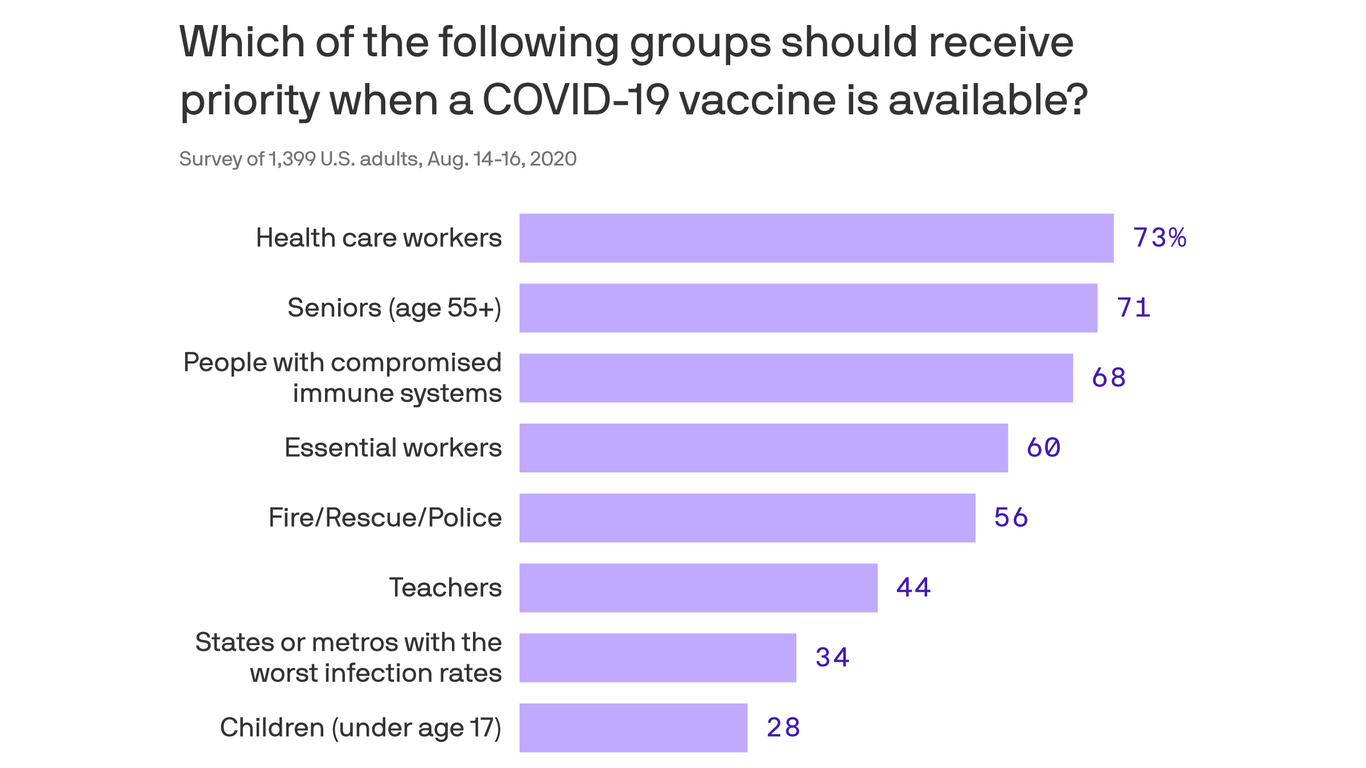
If the U.S. is the first country to develop a coronavirus vaccine, most Americans don't want to share it right away with the rest of the world — but they're OK putting high-risk people at the front of the line within the U.S., according to a new Harris poll shared exclusively with Axios.
Why it matters: Whenever the first vaccine comes, there won't be enough to go around. Experts say both of those tiers of rationing — divvying up the available doses internationally, and then a risk-based system to decide who gets it first within each country — will be necessary.
Where it stands: Dozens of potential vaccines are under development. No product has yet been proven to work, and it’s entirely possible that even the apparent front-runners may not pan out.
- It’s premature to assume that a vaccine is right around the corner, or that the first successful one would be a knockout punch whenever it does arrive.
- But the drumbeat of encouraging news has been steady enough that it’s reasonable to start thinking about how to distribute that first drug, whenever it does arrive.
By the numbers: 69% of respondents in the Harris survey said they’d support a priority system for distributing a vaccine within the U.S., while just 31% said they’d prefer a first-come, first-served approach.
- Support for a priority system was consistently high among men and women, Republicans and Democrats and all income levels.
- 73% said health care workers should get priority access to a vaccine once there is one, followed by seniors (71%), people with compromised immune systems (68%) and essential workers (60%).
Between the lines: This sort of structured, risk-based allocation would be a lot different from what most Americans are used to, in a health care system that typically allocates resources based on patients' ability to pay.
- If people are already getting comfortable with the idea of waiting in line before getting access to a vaccine, that could help make this high-stakes, highly complex process work.
Yes, but: Although most Americans are on board with a priority system domestically, they’re not wild about the same kind of risk-based allocation internationally.
- 66% of Americans said that if the U.S. develops the vaccine, it should only be made available abroad after all U.S. orders have been filled; just 34% said it should be made available overseas immediately.
Three countries are at the front of the pack in the vaccine race: The U.S., China and the U.K. No matter who gets there first, they won’t have enough available to vaccinate their entire populations, or anywhere close to it.
- Experts say the “winning” country will likely have some advantage when it comes time to distribute the available doses, but if any one country is able to hoard them all, the global pandemic could rage on for years.
Americans are more skeptical of foreign-developed vaccines: Overall, 69% said they are at least somewhat likely to take a COVID-19 vaccine as soon as it’s available. But asked whether they’d use a vaccine developed by another country, that number slipped to 51%.
Methodology: The Harris survey was conducted Aug. 14-16 among a representative sample of 1,967 American adults.
"want" - Google News
August 24, 2020 at 04:01PM
https://ift.tt/32qvYfg
Americans want high-risk people to get a coronavirus vaccine first - Axios
"want" - Google News
https://ift.tt/31yeVa2
https://ift.tt/2YsHiXz
Bagikan Berita Ini















0 Response to "Americans want high-risk people to get a coronavirus vaccine first - Axios"
Post a Comment